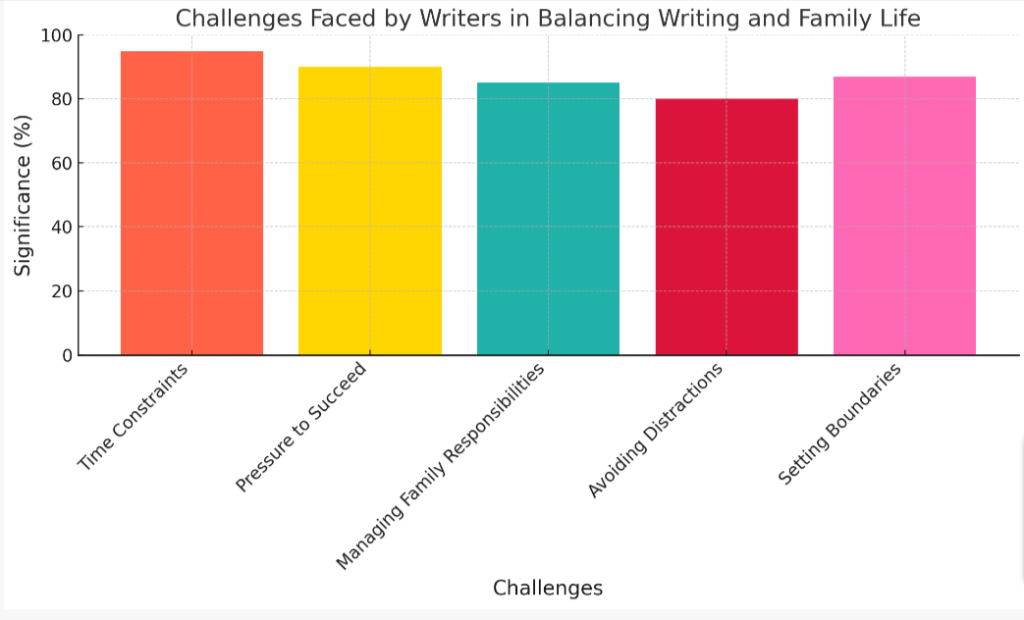Harmonizing Heart and Art: Self-Care Strategies for Writers
Balancing writing and family life is a challenge many authors face daily. In fact, according to the American Psychological Association, over 60% of working adults struggle with achieving work-family balance.
This article aims to help you meet this challenge head-on by emphasizing the crucial role self-care plays in maintaining this balance. Ready to redefine your routine? Let’s dive into it!
Key Takeaways
- Self-care plays a crucial role in balancing writing and family responsibilities, as it helps maintain physical, mental, and emotional well-being.
- Strategies such as prioritizing tasks, setting clear boundaries, building a support network, creating efficient systems, and making time for personal self-care are essential for achieving work-life balance.
- Effective time management techniques can help writers allocate dedicated time for both writing and family responsibilities.
- Setting realistic goals and effectively communicating needs with loved ones are important strategies for finding a balance between writing pursuits and family obligations.
Understanding Self-Care and Its Importance
Self-care is the practice of taking care of one’s own physical, mental, and emotional well-being, and it plays a crucial role in balancing writing and family responsibilities.
Definition of self-care
Self-care refers to actions that individuals take in order to maintain their physical, mental, and emotional health. It revolves around activities that people engage in on a daily basis that contribute to their well-being and enhance their quality of life.
These include eating balanced meals, getting adequate sleep, engaging in regular exercise, maintaining personal hygiene, seeking medical attention when necessary and taking time out for relaxation or fun.
Self-care also covers the maintenance of healthy relationships with others by establishing boundaries and ensuring some alone time for self-reflection and rejuvenation. The practices differ from person to person as it is based on individual needs and lifestyle choices.
Benefits of self-care for overall well-being
Self-care serves as a powerful tool in boosting overall well-being. Engaging in self-care activities can significantly enhance emotional health, paving the way for stronger social connections and better stress management.
The practice nurtures your spiritual wellbeing, fostering greater peace of mind and clarity. It also bolsters physical health by encouraging habits like regular exercise, balanced nutrition, and adequate rest.
Furthermore, self-care helps to mitigate burnout risks often associated with trying to balance demanding roles like writing and family responsibilities simultaneously. By prioritizing self-care amid busy schedules, one creates an environment that supports their mental wellbeing which is central to maintaining productivity and achieving work-life balance effectively.
Balancing Writing and Family Responsibilities
To balance writing and family responsibilities, it is crucial to prioritize and delegate tasks effectively, establish clear boundaries, build a support network, create efficient systems, and make time for personal self-care.
Prioritizing and delegating tasks
Mastering the skill of task prioritization is crucial in achieving a balance between your writing profession and family responsibilities. Here’s how:
- Identify urgent tasks: Determine which tasks require immediate attention.
- Prioritize according to importance: Not all tasks are equally important, learn to identify ones that truly matter to meet your goals.
- Use tools for organization: Make use of apps and planners to keep you organized and focused on your priorities.
- Delegate when possible: If other people can handle certain tasks, do not hesitate to delegate or outsource them.
- Make a daily schedule: Plan your day ahead, outlining time slots for each task reduces stress levels.
- Be flexible with changes: Sometimes unexpected things may come up; it’s important to adjust and adapt accordingly.
- Avoid multitasking: Focusing on one task at a time increases productivity and efficiency.
Establishing clear boundaries
Setting clear boundaries is crucial for maintaining a healthy balance between writing and family responsibilities. By clearly defining what is acceptable and not acceptable in terms of time spent on work and personal life, you can avoid feeling overwhelmed or guilty.
Communicate your boundaries with your family members, so they understand when you need uninterrupted time to focus on your writing. This will help create a supportive environment where everyone respects each other’s needs and priorities.
With these clear boundaries in place, you can effectively manage both your writing career and family life without sacrificing one for the other.
Building a support network
Building a support network is crucial for writers who are trying to balance their writing and family responsibilities. Having a reliable group of people around you can provide the emotional support, encouragement, and practical help needed to navigate the challenges of both roles.
It could include friends, fellow writers, mentors, or even family members who understand and respect your commitments as a writer and the importance of self-care. By surrounding yourself with like-minded individuals who share your passion for writing and understand the demands it may place on your time, you can lean on them when you need assistance or advice.
This support network can also serve as an accountability system, keeping you motivated and focused on achieving your writing goals while maintaining a healthy work-life balance.
Creating efficient systems
Creating efficient systems is essential for balancing writing and family responsibilities. It helps streamline tasks, maximize productivity, and reduce stress. Here are some strategies to create efficient systems:
- Set up a schedule: Create a daily or weekly schedule that includes dedicated time for writing, family activities, and self-care.
- Prioritize tasks: Make a to-do list and prioritize tasks based on urgency and importance. Focus on completing high-priority items first.
- Delegate responsibilities: Identify tasks that can be delegated to other family members or outsourced to free up your time for writing.
- Use technology tools: Explore apps or software that can help with organization, time management, and tracking progress on writing projects.
- Create routines: Establish consistent routines for writing, including designated times and places where you can focus without interruptions.
- Minimize distractions: Identify potential distractions and find ways to minimize or eliminate them during your dedicated writing time.
- Break tasks into smaller steps: Divide larger writing projects into smaller tasks to make them more manageable and easier to tackle.
- Batch similar activities together: Group similar activities like research or editing together to minimize context-switching and improve efficiency.
Making time for personal self-care
Prioritizing self-care is essential when balancing writing and family responsibilities. By setting aside dedicated time for personal self-care, writers can recharge, reduce stress levels, and improve overall well-being.
This can include activities such as exercise, meditation, journaling, or pursuing hobbies that bring joy and relaxation. Making self-care a priority allows writers to maintain their mental and emotional health while also being present for their families.
It’s important to remember that taking care of oneself is not selfish but rather a necessary step towards achieving work-life balance and preventing burnout in the long run.
Strategies for Balancing Writing and Family Responsibilities
Implementing effective time management techniques, such as creating a schedule and setting aside dedicated writing and family time, can help maintain a healthy work-life balance.
Time management techniques
Manage your time effectively by implementing these techniques:
- Prioritize tasks based on importance and urgency.
- Break larger tasks into smaller, more manageable steps.
- Set specific goals and deadlines to stay focused and motivated.
- Use a planner or digital calendar to schedule activities and allocate time for writing and family responsibilities.
- Eliminate distractions by turning off notifications or working in a quiet space.
- Practice the Pomodoro Technique by working for 25 minutes, then taking a short break before starting again.
- Utilize time – saving tools like productivity apps or timers to track progress and stay on track.
- Delegate tasks that can be done by others, freeing up more time for writing or spending with your family.
- Avoid overcommitting yourself by learning to say no when necessary.
- Take regular breaks to recharge and avoid burnout.
Setting realistic goals
Setting realistic goals is a crucial strategy for balancing writing and family responsibilities. When we set achievable objectives, it helps us stay focused, motivated, and productive.
By breaking down larger tasks into smaller, manageable ones, we can make steady progress without feeling overwhelmed. Setting deadlines for ourselves also creates a sense of accountability and encourages us to stay on track.
By setting realistic goals that align with our priorities and capabilities, we can effectively balance our writing projects with our family responsibilities while maintaining our overall well-being.
Communicating your needs with family and friends
Effective communication is crucial when balancing writing with family responsibilities. It is important to clearly communicate your needs and expectations with your loved ones, so they understand the time and space you require for your writing pursuits.
By expressing your desires openly, you can avoid misunderstandings and conflicts that may arise from unmet expectations. Establishing open lines of communication allows for a supportive environment where both you and your family can thrive harmoniously.
Additionally, being transparent about your goals and aspirations helps foster understanding among family members and friends. When they see the importance you place on your writing endeavors, they are more likely to respect and support your need for dedicated time to focus on it.
Identifying and prioritizing obligations
Identifying and prioritizing obligations is essential for finding a balance between writing and family responsibilities. It allows you to focus on what really matters and allocate your time and energy accordingly. Here are some strategies to help you effectively identify and prioritize your obligations:
- Make a list of all your responsibilities, both in writing and in your family life.
- Evaluate each obligation based on its importance, urgency, and impact on your overall well – being.
- Identify the tasks that align with your long – term goals and values.
- Consider the consequences of not fulfilling certain obligations.
- Determine which tasks can be delegated or postponed without compromising your well – being or relationships.
- Be honest with yourself about what you can realistically handle and let go of unnecessary commitments.
- Communicate with your loved ones about your priorities and negotiate if necessary.
- Regularly reassess and adjust your priorities as circumstances change.

Conclusion
Prioritizing self-care is crucial for maintaining a healthy balance between writing and family responsibilities. By implementing effective time management techniques, setting realistic goals, and establishing clear boundaries, writers can ensure that they take care of their emotional, mental, physical, and spiritual well-being.
With the right strategies in place, writers can not only prevent burnout but also enhance their overall productivity and work-life balance.

